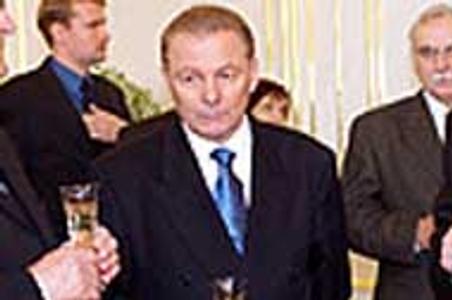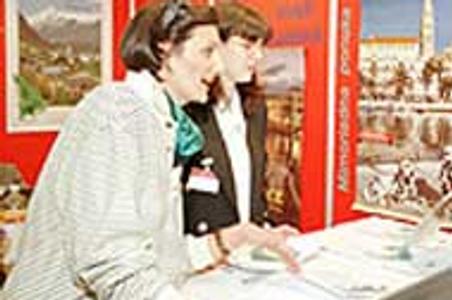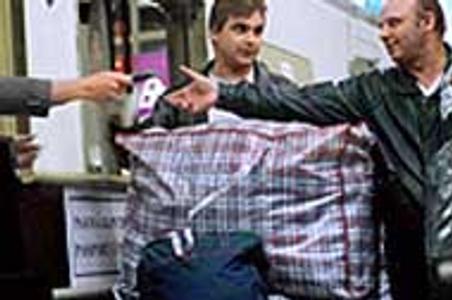Archive of articles - January 2000, page 3
If you desire to read an old article, use the search bar or select the publication date.
Gaulieder: No satisfaction yet
Parliament in January is once again to take up the controversial case of former MP František Gaulieder, who as a member of the then-governing HZDS party was stripped of his parliamentary mandate in December 1996. Although the new government has proposed to annul the decision of its predecessor, Gaulieder says he is not satisfied and wants over $500,000 in financial compensation as well."I have committed myself in an official document to use this money to create a foundation supporting young people who cannot afford an adequate education," Gaulieder said in an interview on January 17 with The Slovak Spectator. "I am disappointed with the attitude of the current government, because this case could have been wrapped up a long time ago."
Corruption 2000: Red in tooth and claw
"The stability of the government...depends on whether or not the parties of the government become hostages to organized interests."Those are strong words, coming as they did last week from Finance Minister Brigita Schmögnerová. But barely two weeks into the new year, with the cabinet pinned and wriggling under a fresh scandal, it seems that Schmögnerová may have even underestimated the threat posed by Slovakia's economic lobbies.
THE LAST WORD
The intensity of organised interests in the sphere of economy is higher than anywhere else. During the transformation process, these interests were most visible in privatisation. The phenomenon begins to be dangerous only when these group interests begin to dictate and control the economic policy of a state, and when interests of society begin to be subject to them.Slovakia was going in this direction during the previous period, when interest groups dictated to then-Prime Minister Vladimír Mečiar. It is still an open question whether the 1998 general elections stopped us from going in this unfavourable direction. The stability of the ruling coalition depends on whether the coalition parties do or do not become hostages to different interest groups. The problems within the SDK are not primarily political ones. Rather, behind them lie conflicts between the lobby groups that stand behind the individual parties.
Top Pick: Czech singer Lucie Bílá hits Bratislava
As a young bouncy artist in the 1980's, Czech singer Lucie Bílá first found success when she recorded the hit-song "White Trainers". She then successfully transformed her style in the early 90's, maturing into the role of an intelligent, well-respected and strong woman.In 1999, Bílá was again the recipient of the prestigious 'Best Czech Singer' award. Her new album entitled "Nahá" (Naked) was an instant success among her legions of faithful fans in both the Czech Republic and Slovakia. Singing many of her new and classic pop songs as well as the unforgettable scores she performed for the musical performance of Dracula, Bílá will perform on the PKO stage in Bratislava on February 8.Tickets prices range from 350 to 500 Slovak crowns, and are available at the PKO Ticket office, Hviezdoslavovo námestie 24, open Mon.-Fri., 10-17, Tel.: 54 43 38 67. PKO, at 19:00.
Local contractors hold a few trump cards in fight for contracts
The political and economic uncertainty in the Slovak Republic since its division from the Czech Republic at the beginning of 1993 has been a deciding factor in keeping investors out of the Slovak market. It is not surprising that foreign investors new to the Slovak market will seek to limit their risk by choosing an international /western contractor with whom they are familiar and who can demonstrate a track record in the type of construction being considered. There are alternatives, however.Western contractors are perceived (especially by western clients) as being able to provide a level of quality and professionalism that is a cut above the local alternatives. Western contractors may be financially more stable and are able to provide a western level of guarantees and insurance as well as a higher degree of management expertise and quality control.
Foreign Cuisine
Pizzeria Saranda-Ristorante (Italian) $Spaghetti & Company (Italian) $Jasmin (Chinese) $$Chez David (Jewish) $$La Dolce Vita (Balkan) $$$
Ján Mazák: 'We all feel the need' to amend Constitution
Košice-born Ján Mazák is Slovakia's new Constitutional Court Chief Justice, scheduled to take office on January 22. Only 45, he was nominated to the post by outgoing chief justice Milan Čič and confirmed by his former colleague in the Party of Civil Understanding, current President Rudolf Schuster.Mazák is a step removed from the sober, severe image cut by senior judicial figures the world over. Although he extols the work of Russian novelist Dostojevsky, he also has a taste for the teen rock band Offspring. He's a swimming enthusiast who loves Prague and Slovakia's Low Tatra mountains. He's a respected legal professional who believes that political nominees bring authority to the work of top courts.
News Briefs
SNS MP's refuse to surrender parliamentary postsHZDS legal experts outraged by anti-amnesty draftSupreme Court boss repeats call for independence
Tourism figures please ministry
Unlike the majestic natural peaks and valleys that draw millions of visitors to Slovakia each year, the numerical peaks and valleys of the country's tourism industry over the past decade paint a less inspring picture, and evoke much frustration among those in the business.Local travel agencies say that tourism numbers at the turn of the millenium have fallen a long way from their peak in the mid-1990's (see chart, this page), and blame the government for failing to pay sufficient attention to tourism in Slovakia. Government officials, however, point to a small increase in both tourism revenues and visitors in 1999 as cause for celebration, and say that with tourism-friendly legislation in the works, the industry has a bright future.
Community Calendar
British Chamber of CommerceAmerican Chamber of CommerceInternational Women's Club of Bratislava
Made-over Košice in deep debt
The beautifully reconstructed buildings in the downtown core of Košice make this eastern Slovak regional capital a truly memorable destination. Much of the credit among city residents goes to current President Rudolf Schuster, who in his almost five years as Košice mayor put the town back on the tourist map.But as the city begins to add up the bills for the Schuster-era reconstruction spree, which brought a 'musical fountain' among other extravangances to this historic 13th century site, it is beginning to appreciate the long-term damage wrought by the former mayor's reckless spending.The irony is literally everywhere you look. The freshly reconstructed Historical Town Hall on Košice's Hlavná ulica (Main Street) cost about 50 million Slovak crowns to rebuild; it now serves as collateral for recently issued municipal bonds, as does the 19th century Jakabov Palace.
US military leader praises Slovakia
The chairman of the US Joint Chiefs of Staff, General Henry Hugh Shelton, said on January 11 that Slovakia was on the right track towards NATO membership, but stopped short of actually predicting when the country might expect to join the military alliance."When another round for new members coming into NATO will take place is a political decision, and to my knowledge it has not been decided when [it will take place] or who [will be asked to join]," Shelton said during a speech in Bratislava's Forum Hotel.One of America's most senior military men, Shelton was visiting Slovakia to begin a tour of many European nations. He held meetings with senior Slovak Defence Ministry officials, during which he discussed Slovakia's programme of military reform and its participation in a national Action Plan for Membership.
Economic Briefs
FNM promises to speed up privatisationsING forecasts sharp interest rate fall in 2000Real industrial wages down 4% in latest figuresEnergy policy debate stalled over MochovceMachinery industry deal reached on wagesSlovak tourism group asks for more moneyFDI less than 7 billion Sk during 1-3Q99
Roma flight stumps officials
Judging from their recent statements, Slovak public officials are clearly at their wits' end where the country's Romany population is concerned.Groups of Slovak Romanies have been on the move again in January, arriving in Helsinki in a steady stream to demand asylum. According to Foreign Ministry spokesman Boris Gandel, 68 Romanies had arrived in the Finnish capital by January 4, after over 1,400 applied for asylum in Helsinki in 1999. The Finnish government was to decide whether to reintroduce a visa requirement for Slovaks on January 13.
News Briefs
Charges dropped against former SIS officerWiersma: Slovakia has taken right path since 1998 electionsOpposition restless, demands more postsNorway promises to toughen asylum lawSlovakia-US open skies deal to boost economy
Internships most effective job-search
Internships for business students are quite common in leading Western business schools. This mechanism introduces students, usually in their last year of study, to the world of commerce. Internships teach through direct involvement and real world experience, complementing the theory and ideas learned in the classroom. Internships produce benefits for all parties involved: firms, educational institutions and students.
Slovakofarma churns out stable profits
While other staple Slovak companies like steel-maker VSŽ and the Slovnaft refinery struggle to regain lost profits and trust, pharmaceuticals producer Slovakofarma remains a model of stability. Based in the small western Slovak town Hlohovec, the company has consolidated its position on the Slovak and Czech markets and turned a steady profit over the last five years.But equity analysts now say that Slovakofarma must expand into other central European markets if it hopes to attract investment, and add that they are worried by how little the company spends on developing its own products, a key component of success in the drug business. Management at the pharmaceutical giant has both acknowledged the need to expand and promised to put more money into research and development.
Internet can transform purchasing
The Internet currently offers several attractive ways for firms to order goods from their suppliers. By using IT solutions that allow purchasing through the Internet, firms can streamline their buying operations and get better deals on supplies, while suppliers themselves can find more customers through such tools as online exchanges.Many organisations spend 60% or more of their revenues buying goods and services, so reducing and controlling this cost has a direct effect on the bottom line. There are IT solutions available to make purchasing both time- and cost-efficient for all sizes of company.
Market not dead, just fast asleep
The real estate market in Slovakia has its roots in the fall of the iron curtain in 1989, when sweeping changes in ownership rights occured, restitutions and privatisation began, and the first private entrepreneurs appeared.The property market in the early 1990's saw an abrupt growth in the value of each type of property. Purchase and rental prices for residential real estate soared to unbelievable heights in 1991 and 1992, as many Slovak citizens and expats working for foreign companies sought more comfortable living arrangements in family houses and villas. The expanding business activities of foreign companies in Slovakia sparked a boom in commercial real estate as well. New offices, shops, stores, warehouses and plants sprang up as the property market took off.
- Top 10 events in Bratislava for foreigners
- Weekend: Celebration of fun comes to Malacky Photo
- No more photos or bank statements? Slovakia moves to ease residence process
- Slovakia loses another EV model to Spain as Stellantis chooses Zaragoza over Trnava
- News digest: Prosecutor seeks jail for NBS Governor Kažimír as his political support wanes
- Maria Theresa on the banks of Bratislava
- Paris leads, Bratislava trails: European cities ranked on safe travel for children
- News digest: Fico’s bloc wants to save money by restricting electoral access
- Maria Theresa on the banks of Bratislava
- No more photos or bank statements? Slovakia moves to ease residence process
- Weekend: Celebration of fun comes to Malacky Photo
- Top 10 events in Bratislava for foreigners
- News digest: Fico’s bloc wants to save money by restricting electoral access
- 3 free things to do in Bratislava in the next seven days
- Digital Jarvis is real now. He is coming for your to-do list
- Slovakia plans to restrict access to new medicines amid funding shortfall
- Maria Theresa on the banks of Bratislava
- No more photos or bank statements? Slovakia moves to ease residence process
- News digest: Violent gang in Bratislava is under arrest
- The Kremlin’s security agency has a Russian contractor in Slovakia - no one has noticed
- 3 free things to do in Bratislava in the next seven days
- Weekend: Celebration of fun comes to Malacky Photo
- Digital Jarvis is real now. He is coming for your to-do list
- Top 10 events in Bratislava for foreigners
- Maria Theresa on the banks of Bratislava
- A mayor resigns over €2.7 million fraud scandal at town hall
- Show me your moves! Slovak hockey stars share their best pick-up lines
- No more photos or bank statements? Slovakia moves to ease residence process
- He designed Gatwick. But this is his masterpiece
- Fico praises China and Vietnam as models, says liberal democracy has failed
- News digest: Violent gang in Bratislava is under arrest
- The compass points to Kúty, and people are starting to follow
- News digest: Prosecutor seeks jail for NBS Governor Kažimír as his political support wanes
- Slovakia loses another EV model to Spain as Stellantis chooses Zaragoza over Trnava
- Slovak female triathlete shatters barriers with historic win at Himalayan event
- Weekend: Celebration of fun comes to Malacky Photo
- News digest: Fico’s bloc wants to save money by restricting electoral access
- Slovakia plans to restrict access to new medicines amid funding shortfall
- No more photos or bank statements? Slovakia moves to ease residence process
- Top 10 events in Bratislava for foreigners More articles ›








